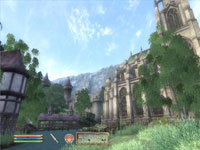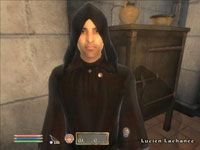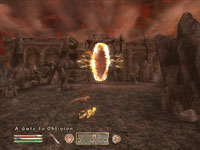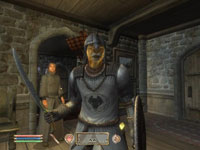
Living In Oblivion 296
The Elder Scrolls series is well known among PC gamers as the high water mark for an open-ended RPG experience. The series, set in the world of Tamriel, has a staggering breadth and depth thanks to the exacting standards of the team at Bethesda Softworks. The newest title in the line brings Tamriel to life in a manner that is renewing the faith of even the most jaded CRPG player. Elder Scrolls IV: Oblivion may not be the perfect game for everyone. For those willing to give it a shot, Oblivion treats gamers with a level of respect that is unique, uplifting, and (hopefully) inspirational for game developers in all genres. Read on for my impressions of a truly unique game.
- Title: Elder Scrolls IV: Oblivion
- Developer: Bethesda Softworks
- Publisher: 2K
- System:PC (360)
This latter category of CRPG is, regrettably, on the wane. The type of gamer who enjoys this genre has been drawn away by the promise of multiplayer interaction, either in MUDS or MOOs or in their more graphically advanced MMORPG offspring. Since the days of Baldur's Gate and Planescape: Torment fewer and fewer of these non-linear titles, with an emphasis on creating an actual role to play, have been lining shelves. The grandaddy of this genre is the previous chapter in the Elder Scrolls saga. Morrowind let you loose on an island nation with little more than a race, astrological symbol, and some skills. Once you were in the game there wasn't a single constraint on your actions. An advanced world editor ensured that a player who tired of the hundreds of hours of potential gameplay in the shipped title could download content from his fellow gamers. From the smallest item all the way to entire additional continents, this content has kept dedicated players busy since the game's launch in 2002.
These players can move on, finally, as Oblivion steps ably into its older brother's very big shoes. The level of polish this game displays is such that it is hard not to wander into hyperbole when describing what they got right. In point of fact, it's hard to nail down something they got wrong when keeping the genre as a whole in mind. There are, however, some big obstacles to enjoying the game. The most daunting can be a simple question of technology. A lot of game impressions seem to be based on the Xbox 360 version of the title, and for good reason. The 'recommended specs' on the side of the PC box could make anyone pause. A three gig processor, at least a gig of memory, and (if you're using Nvidia as your yardstick) a 6800 or better graphics card are what they suggest. I'll be honest, I don't reach the recommended specs. I've got a 2 gig processor and a 6600 card. Anticipating the game, I did upgrade to 2 gigs of memory as a stopgap measure, and I really noticed that purchase in the lightning-fast load times. Graphically, though, I know I'm not seeing the full experience. Unless you have a high-end rig, you're probably going to want to go with the 360 version. I'm told it has noticeable load times and some occasional control frustrations, but if your computer can't handle the title at least you can play the game.
The second roadblock potential players might encounter is one of the game's biggest strengths: the open-ended gameplay. Once you've finished the tutorial dungeon you're let loose with absolutely no strings attached. Tamriel is your world to explore, and you can do it however you wish. There is about 100x more direction in Oblivion than there was in Morrowind, and various gameplay elements make it much easier to get where you're going and know what you're doing. Just the same, if you like having a clear goal the freedom of Oblivon may throw you. The entrants in the Final Fantasy series look like barely interactive movies in comparison.
Finally, an aspect of the title that's throwing even dedicated players may prove to be the final straw for folks new to the series. There's no other way to say it: Oblivion is harsh. With freedom comes consequences, and for a certain kind of player Elder Scrolls IV may be a very frustrating experience. The best example of this philosophy is in character creation. It's entirely possible to create a useless character if you make the wrong choices. They give you an array of pre-generated character roles to choose from, and it's hard to go completely wrong if you pick one of those. If you so choose, however, you can roll your own class. If you really want to, you can set off into Tamriel with little or no experience in wielding a weapon. Oblivion is far more than your usual hack-and-slash, but there is still a lot of combat in the game, and such a character will probably have a very hard time of it. That combat, too, can be brutally unforgiving. Enemies throughout the land scale as you gain in strength, so the hope is that you won't ever come up against an opponent that's completely out of your league. Within your 'league', though, you can come up against enemies that are almost impossible to defeat. That can depend on the character just as much as the enemies involved, and either way the game isn't going to sit there and hold your hand.
With those caveats out of the way, I'll engage in just a little bit of hyperbole. Oblivion is the most engaging RPG I have ever played. It captures the essence of what makes tabletop roleplaying so enjoyable, and allows you as the player access to a sprawling and beautifully realized world of possibilities.
From the first moment you enter the world, the occupant of a dank jail cell, you'll be struck by the depth of the experience. A fellow prisoner makes rude comments to you from across the hallway, and the guards which appear at your door make no bones about their willingness to kill you. They're there guarding the emperor, who is fleeing an assassination attempt. Your tutorial for the game has you following the emperor (voiced by Patrick Stewart), and exploring a small cave system beneath the Imperial prison. Game elements are well explained, with numerous opportunities to practice combat tactics, stealth, and spellcasting. By the time you leave the cavern, you'll have chosen your race and class and borne witness to the death of the empire's leader. Blinking in the sudden light, on a grass-covered hill outside the Prison walls, you have a quest in your journal and a million options open before you.
This sense of freedom is Oblivion's most engaging quality. While the emperor asked with his dying breath that you travel to a Priory in the north and find his illegitimate son, you are under no obligation to do so. Ever. There is enough to do in the world of Tamriel that if you so choose you can spend the rest of your play experience happily ignoring the looming threat implied by the main quest. The main quest is well-written, and if you follow through with the line's goals you'll be rewarded through fame and fortune. Unlike other titles with the implication of 'freedom', Oblivion really does offer far more than just the central script. Just walking down a street in one of the many cities of the empire will allow you to overhear the possibility of adventure. The Non-Player Characters (NPCs) of Oblivion are wonderfully written, and all have their own very specific needs. Their AI puts them through a normal routine every in-game day, and causes the characters to interact in very realistic ways. While a peasant's normal day might involve working in a farm outside the city, stopping at a tavern for a meal, and then heading home for bed, it's possible that could be disrupted by the actions of another character. If it is, you can bet that there's a quest waiting for you.
This level of depth is supported by the game's many conveniences. The number of quests the citizens of Tamriel will throw your way would make it impossible to handle if you didn't have a good level of support. The game offers a featureful quest journal, which not only shows what quests you're on, but quests that you've completed and prior steps to ongoing quests. Quest goals are clearly marked on your world map, ensuring that even if you are unsure of what exactly to do you can always know where you're supposed to go. The game features a 'fast travel' system that can take some of the tedium of overland riding out of the game. If you do choose to travel overland, you'll encounter new adventure locales and opportunities for questing, but the option of moving quickly from place to place is really nice.
What you actually do on quest is extremely varied. While there are some quests that fit into the usual 'kill the x for me' or 'deliver this to so-and-so', a surprising number of them substantially differ from the norm. There are diplomatic missions, like the request from the invisible people of Aleswell. An entire village turned translucent by a thoughtless wizard wants you to go talk him into turning them back. The Thieves Guild quests primarily revolve around entering private areas and coming away clean with an item or items. One involved quest line I explored had me following around a merchant, who turned out to be purchasing his wares from a graverobber. While the quest line did end in a confrontation with the scoundrel, there was far more to the quest than simply 'go here and kill the bad guy'. Quests in Oblivion are deeply satisfying in a way that many RPGs (especially MMOGs) can't even approach.
All that said, if you're not in the mood for considered action there's always monster hunting to lighten the mood. Ruins are scattered liberally across the empire, and exploring them will lead you into numerous combat situations. Combat in Oblivion shares the same first-person melee setup that Morrowind used. You hack and slash at your foes from behind your character's eyes, resulting in an immediacy to combat that raises the blood pressure quite effectively. There are several ways to fight, each with its own distinct 'feel'. Melee combat has a great kinesthetic feel, with your character swaying and moving in time to the action. Slashing your weapon across your field of view is enormously satisfying, and creatures bleed profusely when poked. Melee skills have been simplified a great deal, with 'Blade', 'Blunt', and 'Hand-to-Hand' constituting the three main options you have in this field. If ranged combat is your preference, 'Marksman' is the skill you'll want. Drawing an arrow on a bow conveys a real sense of power, and the whistling sound that accompanies a flying projectile imparts your shots with a deadly beauty. Ranged combat is most useful, I've found, to use when stealthing. Entering 'stealth' mode allows you to move quietly and unseen through the halls of the dungeon. If you can get off a shot with your bow or blade while remaining undetected, your initial blow will do far more damage. You'll be doing a lot of combat throughout your adventuring career, so the fact that they just nailed the feel of chaotic encounters makes it hard to get bored while exploring the depths.
Every system, in fact, has the mark of quality stamped upon it. Magic is just as engaging as the combat elements, with different schools covering a wide variety of spell effects. Spells are broken out into separate schools, which don't directly tie together. You can choose, for example, to improve your ability to cast healing spells and ignore other spellcasting elements. If you want to broaden your scope, the different schools can be used in synergy to create excellent effects. Magic schools, sneaking, bladework, and shield blocking are all covered by skills which improve as you use them. 'Leveling up' occurs when you've crossed a certain threshold of skills points acquired. Your increase in power (both via level and skill increase) is visible and enjoyable, with benefits to your prowess in battle immediately apparent during gameplay. There are also non-combat skills, which are just as well thought out as the more violent sort. Lockpicking and Speechcraft are mini-games, and both allow access to secrets you might not otherwise ever see. You can repair your armor or brew potions, as you'd like. You can leap from rooftop to rooftop to improve your Acrobatics, and haggle with merchants to improve Mercantile. The tapestry of skills works so well because not only do they hang well separately, they mesh together into a cohesive whole. Your character, as your window into Tamriel, manages to be just as interesting as the NPCs around you. You can actually find that you surprise yourself with what you can do, a truly rare treat for any game.
All of these well-crafted systems would be fun even if the game only looked 'okay.' What makes Oblivion so easy to lose yourself in, though, is the visual quality and audio presence the designers have lovingly applied to the entire experience. NPCs look at you with expressive eyes and delicate features. Enemy creatures attack with movement appropriate to their style of combat, and light winds stir the grasses around you while you sit and stare up at the beautiful sky. Tamriel is a gorgeous world, and the visual experience completes the powerful force pulling you into the gameworld. There are a lot of 'wow' moments, but what I enjoyed most about the graphical presentation is that after a time you just stop noticing it. Everything looks just right, and makes it easy to slip into your alternate persona.
There's just so much right about this game, it makes me actually a little sad. The strong statements made by the developers are entirely admirable: a harsh and open world where the player is empowered. Those same statements will put off a lot of gamers because we are just not taught to expect much of ourselves when we game. The power, beauty, and depth of this gameworld should be experienced by as many people as possible, and because of the bad lessons taught by other games there are a lot of people that are going to say 'that's not for me'. Oblivion is a game that forces you to make decisions with real consequences, a game that plays out those consequences on the world, and teaches you as the player to think fast and play for keeps. It's real life, packaged into a fantasy format and with a handy quest journal that I constantly find myself missing as I do chores around the house. It does what other games are afraid to do: it respects you. The finest compliment for a game that allows you to fill a role is to find yourself actually believing the role, and Bethesda has given you every tool you need to go off and be your very own hero. In an escapist niche of an escapist hobby, there's not much more you can ask for than that.




the AI (Score:1, Funny)
On AI (Score:4, Funny)
The following are examples of unexpected behavior discovered during early testing:
One character was given a rake and the goal "rake leaves"; another was given a broom and the goal "sweep paths," and this worked smoothly. Then they swapped the items, so that the raker was given a broom and the sweeper was given the rake. In the end, one of them killed the other so he could get the proper item.
Another test had an on-duty NPC guard become hungry. The guard went into the forest to hunt for food. The other guards also left to arrest the truant guard, leaving the town unprotected. The villager NPCs then looted all of the shops, due to the lack of law enforcement.
In another test a minotaur was given a task of protecting a unicorn. However, the minotaur repeatedly tried to kill the unicorn because he was set to be an aggressive creature.
In one Dark Brotherhood quest, the player can meet up with a shady merchant who sells skooma, an in-game drug. During testing, the NPC would be dead when the player got to him. The reason was that NPCs from the local skooma den were trying to get their fix, didn't have any money, and so were killing the merchant to get it.
While testing to confirm that the physics models for a magical item known as the "Skull of Corruption," which creates an evil copy of the character/monster it is used on, were working properly, a tester dropped the item on the ground. An NPC immediately picked it up and used it on the player character, creating a copy of him that proceeded to kill every NPC in sight.
Again with the western vs easten (Score:2, Funny)
I will buy the game if and only if... (Score:3, Funny)
Re:You don't need a monster video card (Score:4, Funny)
what would be nice... (Score:3, Funny)
Seriously - screw the game, I could use this at work!
Although I'd probably settle for being able to use a mace on annoying managers - or, as I like to call them, "boss monsters."
Re:Two Words: Level Scaling (Score:3, Funny)
Which only goes to show, I knew those damned arena fights were rigged!!!
Re:beating a monster you couldn't do at a lower le (Score:2, Funny)
Let's say you are a parasitic worm living inside of a cow. There are also other parasitic worms inside the cow and you have to fight your way for dominance. Being as you are both small, and the same size, it takes you a while to kill one of the other worms. So you kill one and level up. Now all the other worms level up too. Is the next fight against another worm going to be easier or harder? Well, most likely it is going to be the same.
You could say, well, I am a special parasitic worm, I learned some magic spells that enable me to fight better. The difference is, so did the other worms, they got stronger too. In the end, however, you are all just a bunch of worms eating a cow.
In the way life should be for a parasitic worm, as soon as you kill that first opponent, you should level up, and get just a little bit bigger than all the other worms because now you have the experience of besting that first worm. And so maybe you end up being more powerful than the other parasites, and then you are ready for new challenges, like maybe facing a dog that ate the cow and you have to transfer to the new host to survive. Instead, you are stuck in that cow and all the worms you are with are the same worms that will be with you till the end.
Re:On AI (Score:3, Funny)
Re:Worst part: (Score:3, Funny)
Well, that hasn't been my experience. Once equipped with spells like Silence, Paralyze, Missile of Face Melting, Summon Eater of Worlds, and Now You See Me Now You're a Stain, the average opponent becomes easier. Wilderness beasts also do not level past 4, and there are some inredibly tough people like Umbra who will happily dice you like a tomato.